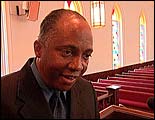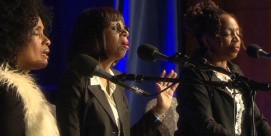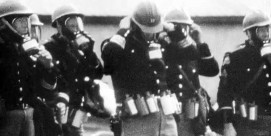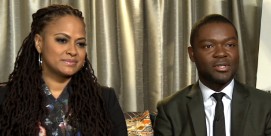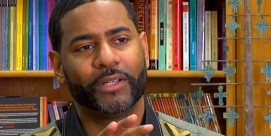In This Episode << SLIDE LEFT TO SEE ADDITIONAL SEGMENTS
Reverend Michael Thurman
Read more of Kim Lawton’s interview about Martin Luther King Jr. and Dexter Avenue Baptist Church with the Reverend Michael Thurman:
The sanctuary is basically what it would’ve looked like during the time of Dr. King’s tenure here. The only thing that is different is there would have been a row of ceiling fans in the ceiling, and the windows would’ve been able to open. You would’ve had the windows open, especially if it was in the summer. There was no air conditioner, or at least very few air conditioners, in 1954 and ’60. But it’s basically the same. The pews are the same. The pews date back to the original date of the church, back in 1889 when the sanctuary was completed. The stained-glass windows — the arch part would date back to the original; the rectangular portion of the windows would’ve been restored during the last restoration a couple of years ago. However, the two up top, they are original as well as the central window. But the pulpit and everything would be pretty much as it would’ve looked in 1954, 1960 — at least when he left. Some pulpit furniture was purchased during his tenure. That was one of his 34-point recommendations that he made his first year on the job — about 34 recommendations that included constructing a new educational facility, the fund raising for that project, the committees. He listed out committee persons and who would chair those committees — just things that you would find in a typical congregation. Dr. King was a Baptist pastor and pastored an African-American congregation in Montgomery. His recommendations would’ve been typical of what you would find in a church’s beginning-of-the-year programming.
Dexter was primarily a middle-class congregation. During that time you would have had a lot of faculty members from Alabama State University and other community members. We’ve always had a cross section of people that made up the congregation; by and large, it had a large percentage of highly educated people, but it’s always had a cross section of people that run the gamut.
[I feel] a tremendous sense of responsibility, a tremendous sense of preservation. I see Dexter as one of the world’s sacred treasures, so this congregation has the awesome task of maintaining it and sustaining it and promoting it, so that tourists that come in from around the world can share in the events that took place here, be inspired and educated by the things that happened again here in Montgomery — also compelling the congregation to continue to reach out, to move forward so that it reaches yet another generation of congregants.
It’s a tremendous challenge [to preach from Dr. King’s pulpit]. How do you take such a sacred treasure and make it live again? How do you take this sacred history and preserve it and package it so that tourists from around the world can share in the events that took place here? How do you construct or craft or engineer quality programs that impact the quality of people’s lives in this day and time? The challenge becomes, how do you make the gospel message relevant, from the first century A.D. to the 21st century, so that people are motivated and moved to action within the world in which we live?
I can identify with his hectic pace. He was a very active pastor within the community, very well loved, very well respected. He visited the members, he engaged in various congregational meetings or various church group activities. Those were some of the things that he’s done that continue to influence me. If you read some of his writings, some of his more intimate correspondence with the congregation, you can feel the sense of compassion that Dr. King had for the membership. And if it were not for the membership, there would be no clergy profession, so we exist to serve the membership.
[The civil rights movement] really overwhelmed his pastorship. In one of the letters that he wrote in the history book that we have, the history of the church, he kind of apologizes to the congregation because he had not been able to accomplish a number of those things on his 34-point recommendations [list], such as leading in the building of an educational facility and that kind of thing. He really apologizes to the congregation because all the overwhelming activities and duties of a larger Montgomery bus boycott had just overwhelmed his schedule. I think he was very effective as a pastor, but what happened was that he just became inundated with tremendous demands, and certainly after the bus boycott his appeal, his role, his status as an international icon began to mushroom, which increasingly kept him away from the pulpit on Sundays out at various parts of the country, etc.
That became God’s calling upon his life. It became his destiny, if you will, and eventually he had to come to grips with the fact that he was not going to be in the pastorate or in the local congregational ministry, but his pulpit had become the world, and that was when he created SCLC [the Southern Christian Leadership Conference] and moved to Atlanta.
Dexter was never the site of a mass meeting, but a number of organizational meetings, including one of the initial meetings to form the Montgomery Improvement Association, were held in the basement of the church. There were a number of congregants who participated in the Montgomery bus boycott during that day and time, but there was never a mass meeting held here [because] the sanctuary was rather small. It wouldn’t accommodate the thousand or so or more. I think on their first [mass] meeting there were about 5,000 out at Holt Street [Baptist Church] that night.
Dr. King’s focus on the “beloved community,” which was inspired by Howard Thurman and a number of other religious leaders, certainly has become a quest of mine. As you look at Dr. King’s writings [from] 40 to 50 years ago and apply them to today’s situations, certainly some of the problems that we’re facing in the world you find him addressing years ago. The timelessness of his message is amazing. I think that’s one of the things that grip us. But primarily Dr. King was a matchless preacher; he was a tremendous orator and had a tremendous ability to move people, to get people to be involved, to get people to be active. One of the roles that the congregation played was that it allowed Dr. King the freedom — there’s a tremendous range of freedom that the African-American clergy has experienced in the community. Because Dr. King was not directly tied to the white power structure of the city, he had an independent source of income, meaning from his congregation, they freed him up to do the things that he did for the larger community, and that has been one of the major roles of the African-American pulpit. Dr. King has inspired us in a lot of ways. I don’t see myself as leading a mass movement down the street or anything; I think my role has been more of developing this congregation for the mission and ministry that it will be called upon to do both today and in the future.
I think a lot of people catapult [Dr. King] out of the pulpit, out of the local church into this international stardom that he had attained and fail to realize that he had his origin, he had his beginning right here in Dexter, in Montgomery, and at Ebenezer in Atlanta. It was the spirituality of the African-American religious heritage which nurtured him, which gave him the underpinnings to lead the movement which he would ultimately lead. It was the African-American church that gave him that springboard, that sense of comfort, that sense of hope with which he would address the world, even before he had learned about the principles of Gandhi and others and about Walter Rauschenbusch’s social gospel movement. It was the African-American church that nurtured him and gave him the sense that God was a god of justice, God was a god of mercy, God was a god of reckoning. It would be those foundations that he would stand upon on the capitol steps about 100 yards from [Dexter], ironically the same steps that Jefferson Davis stood on about 100 years before [when he] brought into existence the Confederate states. Dr. King would stand on those same steps 100 years later and demand the right for African Americans to vote. The African-American church gave him the theological grounding. It was because of his belief in God as a justice-loving god — that through the church and the gospel of Christ, God would bring justice in this situation.
How do you glean from that experience that you as an individual have a responsibility to promote justice and equality for all people? It becomes the church’s responsibility to make sure that when tourists come here, they are inspired as well as challenged by what they see. Through our Dexter King Memorial Foundation we have revamped the parsonage and have it open for tourism. We have the memorial King-Johns garden for reflection. Our role becomes that of an educator of future generations about the events that took place here.

